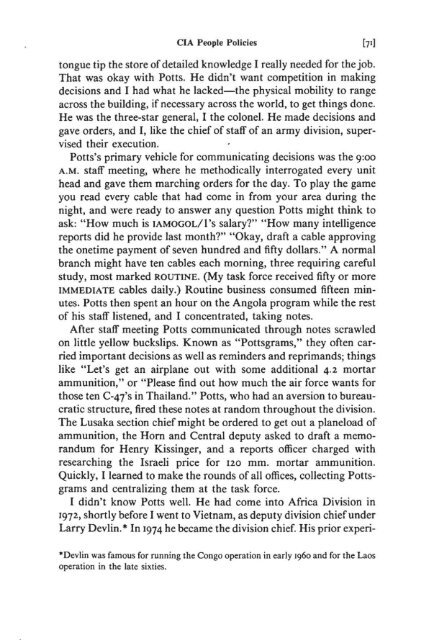In Search of Enemies - A CIA Story - John Stockwell
In Search of Enemies - A CIA Story - John Stockwell
In Search of Enemies - A CIA Story - John Stockwell
You also want an ePaper? Increase the reach of your titles
YUMPU automatically turns print PDFs into web optimized ePapers that Google loves.
<strong>CIA</strong> People Policies<br />
tongue tip the store <strong>of</strong> detailed knowledge I really needed for the job.<br />
That was okay with Potts. He didn't want competition in making<br />
decisions and I had what he lacked-the physical mobility to range<br />
across the building, if necessary across the world, to get things done.<br />
He was the three-star general, I the colonel. He made decisions and<br />
gave orders, and I, like the chief <strong>of</strong> staff <strong>of</strong> an army division, supervised<br />
their execution.<br />
Potts's primary vehicle for communicating decisions was the 9:00<br />
A.M. staff meeting, where he methodically interrogated every unit<br />
head and gave them marching orders for the day. To play the game<br />
you read every cable that had come in from your area during the<br />
night, and were ready to answer any question Potts might think to<br />
ask: "How much is IAMOGOL/1 's salary?,, "How many intelligence<br />
reports did he provide last month?" "Okay, draft a cable approving<br />
the onetime payment <strong>of</strong> seven hundred and fifty dollars.,, A normal<br />
branch might have ten cables each morning, three requiring careful<br />
study, most marked ROUTINE. (My task force received fifty or more<br />
IMMEDIATE cables daily.) Routine business consumed fifteen minutes.<br />
Potts then spent an hour on the Angola program while the rest<br />
<strong>of</strong> his staff listened, and I concentrated, taking notes.<br />
After staff meeting Potts communicated through notes scrawled<br />
on little yellow buckslips. Known as "Pottsgrams," they <strong>of</strong>ten carried<br />
important decisions as well as reminders and reprimands; things<br />
like "Let's get an airplane out with some additional 4.2 mortar<br />
ammunition," or "Please find out how much the air force wants for<br />
those ten C-47's in Thailand." Potts, who had an aversion to bureaucratic<br />
structure, fired these notes at random throughout the division.<br />
The Lusaka section chief might be ordered to get out a planeload <strong>of</strong><br />
ammunition, the Hom and Central deputy asked to draft a memorandum<br />
for Henry Kissinger, and a reports <strong>of</strong>ficer charged with<br />
researching the Israeli price for 120 mm. mortar ammunition.<br />
Quickly, I learned to make the rounds <strong>of</strong> all <strong>of</strong>fices, collecting Pottsgrams<br />
and centralizing them at the task force.<br />
I didn't know Potts well. He had come into Africa Division in<br />
1972, shortly before I went to Vietnam, as deputy division chief under<br />
Larry Devlin.* <strong>In</strong> 1974 he became the division chief. His prior experi-<br />
*Devlin was famous for running the Congo operation in early 1960 and for the Laos<br />
operation in the late sixties.


